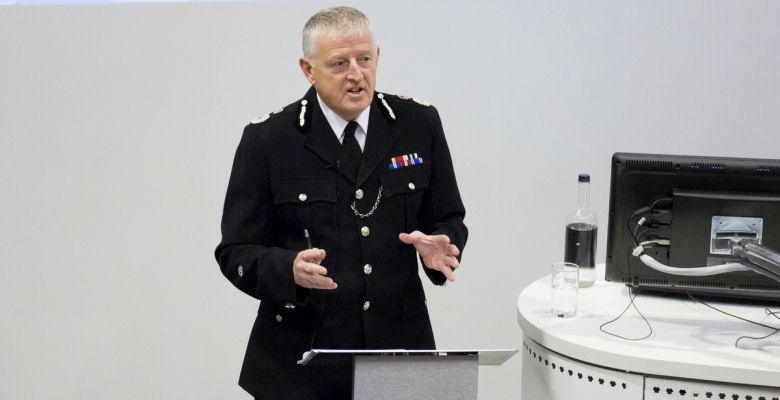Chief's lecture places surveillance in the spotlight
Chiefs lecture places surveillance in the spotlight

Following an introduction by the Vice-Chancellor, Professor Nigel Weatherill, Sir Jon introduced the topic of his lecture as “a serious subject that concerns us all.”
Sir Jon then asked a question of the audience, “How far are we, as a society, prepared to tolerate the state intruding into our freedoms and privacy in order to protect us from an ever-increasing array of threats to our safety, our livelihoods and property?”
The audience heard Sir Jon’s perspective on surveillance, based on the challenges he faces as the authoriser of Merseyside Police investigators’ use of covert techniques for criminal investigations. He played videos taken recently from CCTV systems in Liverpool and from body cameras worn by officers, illustrating the value of CCTV in different contexts.
Sir Jon talked about the emergence of various technologies including CCTV, since he first started in the force in 1974. He then showed a Pathe Newsreel film from 1964 which showed undercover surveillance being used to apprehend car thieves in Liverpool City Centre. “Whilst crime remained physical in nature we were just about able to keep pace – investing in technology where we could to counter the developing threat.”
Citing contemporary factors such as the collapse of Syria and the emergence of ISIS, state espionage and modern slavery as new challenges, Sir Jon made it clear that the old threats have still not gone away. However, "serious organised crime crosses international boundaries and ultimately the harm from these activities plays out in our communities, often in the form of violence and volume crime to feed drug habits."
Sir Jon continued, “all of these threats remind us that the world, including the world outside our door, can be a dangerous place and we, the citizens, need the capacity and capabilities required to keep pace with those intent on causing us harm.”
He then went on to talk about CCTV regulation, quoting a recently British Security Industry Association study which suggests there are over six million CCTV cameras in the UK, or one for every 100 people. He compared this to a report by the Information Commissioner which claims there are 4.2 million cameras, “the reality is, there is no reliable way of establishing the true number.”
Continuing his case for CCTV, Sir Jon said that “I could provide countless examples of serious crime and acts of terrorism being detected through access to CCTV evidence. In 2009 the Met used CCTV in 95 per cent of its murder cases.” He then went on to play an audio excerpt from BBC Radio Merseyside in which the son of an elderly man with Alzheimer’s disease thanked Merseyside Police for helping to find his father who had travelled to London from the Wirral with £100 in cash and no mobile phone. Through the CCTV camera network and cooperation between different agencies, the man was identified by a member of the public following a call-out, the police took custody of the man who was promptly returned home to his family.
“Merseyside Police investigates over 100 people every week who are missing and vulnerable. In many cases, without CCTV we would be far less effective and people would be at risk for longer.”
Sir Jon talked about the legal framework of using intercept evidence to convict people suspected of being involved in criminal activity, particularly the use of intrusive surveillance and concerns people have with public agencies being able to listen in to the content of private conversations. He talked about the Regulation of Investigatory Powers Act, and the safeguards in place to ensure that “the innocent are protected and that the perceived lack of transparency in intercept legislation is being consistently challenged.”
“For me, personal privacy and law enforcement capabilities are not mutually exclusive, provided we have an effective legal framework through which we [Police and Government agencies] are properly accountable.
"Following Sir Jon’s closing address, Steve Moss, programme leader for the Policing Studies degree programme introduced a question and answer session. He read out a number of questions which were submitted by attendees ahead of the lecture for Sir Jon to answer.
Dr Joe Yates, Director for the School of Humanities and Social Science closed the event thanking Sir Jon for his thoughtful and poignant reflections of the role surveillance plays in the 21st Century and his valuable contribution to the debate around this important public issue.
Sir Jon Murphy QPM received an honorary fellowship from Liverpool John Moores University on Thursday 27 November during the first of the University’s winter graduation ceremonies.


